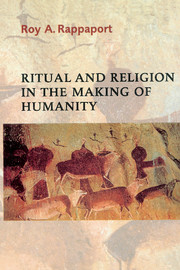Book contents
- Frontmatter
- Contents
- Foreword
- Preface
- 1 Introduction
- 2 The ritual form
- 3 Self-referential messages
- 4 Enactments of meaning
- 5 Word and act, form and substance
- 6 Time and liturgical order
- 7 Intervals, eternity, and communitas
- 8 Simultaneity and hierarchy
- 9 The idea of the sacred
- 10 Sanctification
- 11 Truth and order
- 12 The numinous, the Holy, and the divine
- 13 Religion in adaptation
- 14 The breaking of the Holy and its salvation
- Notes
- References
- Index
- Cambridge Studies in Social and Cultural Anthropology
- Frontmatter
- Contents
- Foreword
- Preface
- 1 Introduction
- 2 The ritual form
- 3 Self-referential messages
- 4 Enactments of meaning
- 5 Word and act, form and substance
- 6 Time and liturgical order
- 7 Intervals, eternity, and communitas
- 8 Simultaneity and hierarchy
- 9 The idea of the sacred
- 10 Sanctification
- 11 Truth and order
- 12 The numinous, the Holy, and the divine
- 13 Religion in adaptation
- 14 The breaking of the Holy and its salvation
- Notes
- References
- Index
- Cambridge Studies in Social and Cultural Anthropology
Summary
The most general aim of this book is to enlarge, if only by a little, our understanding of the nature of religion and of religion in nature. Thus, it is about the nature of humanity, a species that lives, and can only live, in terms of meanings it must construct in a world devoid of intrinsic meaning but subject to physical law.
It will be centrally concerned with religion's most general and universal elements, “The Sacred,” “The Numinous,” “The Occult,” and “The Divine” and with their fusion into “The Holy” in ritual. It will also be concerned, both at first and ultimately, with the evolution of humanity and humanity's place in the evolution of the world.
These two concerns may seem different or even antagonistic but they are not. An argument, close to explicit later in this chapter, remaining subterranean throughout most of this book, although surfacing from time to time and becoming central in the last chapters, not only suggests that religion could not have emerged in the absence of humanity's defining characteristic but the converse, that in the absence of what we, in a common sense way, call religion, humanity could not have emerged from its pre- or proto-human condition. It is, therefore, plausible to suppose, although beyond demonstration's possibilities, that religion's origins are, if not one with the origins of humanity, closely connected to them.
- Type
- Chapter
- Information
- Ritual and Religion in the Making of Humanity , pp. 1 - 22Publisher: Cambridge University PressPrint publication year: 1999



